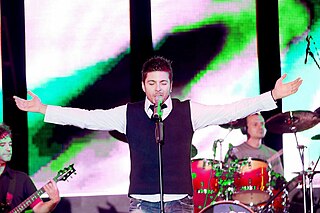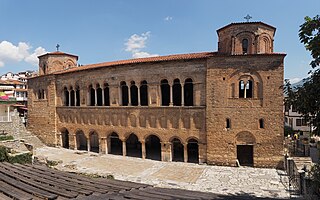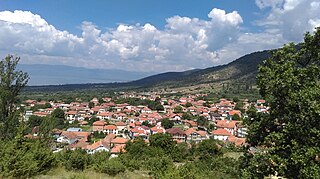The history of North Macedonia encompasses the history of the territory of the modern state of North Macedonia.

Macedonians are a nation and a South Slavic ethnic group native to the region of Macedonia in Southeast Europe. They speak Macedonian, a South Slavic language. The large majority of Macedonians identify as Eastern Orthodox Christians, who share a cultural and historical "Orthodox Byzantine–Slavic heritage" with their neighbours. About two-thirds of all ethnic Macedonians live in North Macedonia and there are also communities in a number of other countries.

The region of Macedonia is known to have been inhabited since Paleolithic times.

The Socialist Republic of Macedonia, or SR Macedonia, commonly referred to as Socialist Macedonia, Yugoslav Macedonia or simply Macedonia, was one of the six constituent republics of the post-World War II Socialist Federal Republic of Yugoslavia, and a nation state of the Macedonians. After the transition of the political system to parliamentary democracy in 1990, the Republic changed its official name to Republic of Macedonia in 1991, and with the beginning of the breakup of Yugoslavia, it declared itself an independent country and held a referendum on 8 September 1991 on which a sovereign and independent state of Macedonia, with a right to enter into any alliance with sovereign states of Yugoslavia was approved.

Todor Proeski was a Macedonian singer and songwriter. Considered a top act of the local Macedonian and Balkan music scene, Proeski's music was popular across multiple countries in Southeast Europe. He was dubbed the "Elvis Presley of the Balkans" by BBC News. He died in a car crash on the Zagreb–Lipovac A3 highway, near Nova Gradiška in Croatia, on the morning of 16 October 2007, aged 26.
Macedonian Australians are Australian citizens of Macedonian descent. Many arrived in the 1920s and 1930s, although larger numbers came to Australia after World War II and the Greek Civil War. By far the largest wave of immigration was during the 1960s and 1970s. As of the 2021 Australian census, Macedonian is the most-spoken Eastern European language in Australia.

The name Macedonia is used in a number of competing or overlapping meanings to describe geographical, political and historical areas, languages and peoples in a part of south-eastern Europe. It has been a major source of political controversy since the early 20th century. The situation is complicated because different ethnic groups use different terminology for the same entity, or the same terminology for different entities, with different political connotations.

Macedonian Americans are Americans of ethnic Macedonian heritage.
Bulgarians are an ethnic minority in North Macedonia. Bulgarians are mostly found in the Strumica area, but over the years, the absolute majority of southeastern North Macedonia have declared themselves Macedonian. The town of Strumica and its surrounding area were part of the Kingdom of Bulgaria between the Balkan wars and the end of World War I, as well as during World War II. The total number of Bulgarians counted in the 2021 Census was 3,504 or roughly 0.2%. Around 98,000 nationals of North Macedonia have received Bulgarian citizenship since 2001 and some 53,000 are still waiting for such, almost all based on declared Bulgarian origin. In the period when North Macedonia was part of Yugoslavia, there was also migration of Bulgarians from the so called Western Outlands in Serbia.

British Serbs or Serbs in the United Kingdom are Serbs and people of Serbian ancestry in the United Kingdom.

The history of Macedonians has been shaped by population shifts and political developments in the southern Balkans, especially within the region of Macedonia. The ideas of separate Macedonian identity grew in significance after the First World War, both in Vardar and among the left-leaning diaspora in Bulgaria, and were endorsed by the Comintern. During the Second World War, these ideas were supported by the Communist Partisans, but the decisive point in the ethnogenesis of these South Slavic people was the creation of the Socialist Republic of Macedonia after World War II, as a new state in the framework of the Socialist Federal Republic of Yugoslavia.

In North Macedonia, the most common religion is Eastern Orthodox Christianity, practiced mainly by ethnic Macedonians, Serbians, Vlakhs, and Romanis. The vast majority of the Eastern Orthodox in the country belong to the Macedonian Orthodox Church, which declared autocephaly from the Serbian Orthodox Church in 1967.

Macedonians in Slovenia are ethnic Macedonians who reside in Slovenia. According to the official census of 2002, there are 3,972 declared Macedonians in Slovenia, with 4,760 listing Macedonian as their mother tongue.

British – Serbian relations are foreign relations between the United Kingdom and Serbia. Both countries established diplomatic relations in 1837. The UK has an embassy and consulate in Belgrade and Serbia has an embassy in London. The Serbian ambassador to the United Kingdom is Dr Dejan Popovic and the British ambassador to Serbia is Sian MacLeod.

North Macedonia, officially the Republic of North Macedonia, is a landlocked country in Southeast Europe. It shares land borders with Kosovo to the northwest, Serbia to the north, Bulgaria to the east, Greece to the south, and Albania to the west. It constitutes approximately the northern third of the larger geographical region of Macedonia. Skopje, the capital and largest city, is home to a quarter of the country's 1.83 million people. The majority of the residents are ethnic Macedonians, a South Slavic people. Albanians form a significant minority at around 25%, followed by Turks, Roma, Serbs, Bosniaks, Aromanians and a few other minorities.

Krani is a village in the Resen Municipality in North Macedonia, roughly 19 kilometres (12 mi) south of the municipal centre of Resen.
Albanian nationalism in North Macedonia traces its roots in the wider Albanian nationalist movement which emerged as a response to the Eastern Crisis (1878) and proposed partitioning of Ottoman Albanian inhabited lands in the Balkans among neighbouring countries. During the remainder of the late Ottoman period various disagreements culminated between Albanian nationalists and the Ottoman Empire over socio-cultural rights. The Balkan Wars (1912–13) ending with Ottoman defeat, Serbian and later Yugoslav sovereignty over the area generated an Albanian nationalism that has become distinct to North Macedonia stressing Albanian language, culture and identity within the context of state and sociopolitical rights. Pan-Albanian sentiments are also present and historically have been achieved only once when western Macedonia was united by Italian Axis forces to their protectorate of Albania during the Second World War.

Gorno Jelovce is a village in the municipality of Gostivar, North Macedonia.

North Macedonia–United Kingdom relations are the bilateral and diplomatic relations between the Republic of North Macedonia and the United Kingdom of Great Britain and Northern Ireland. Both countries are members of the Council of Europe and NATO.















